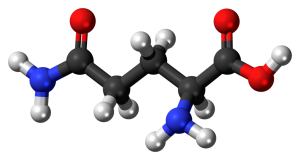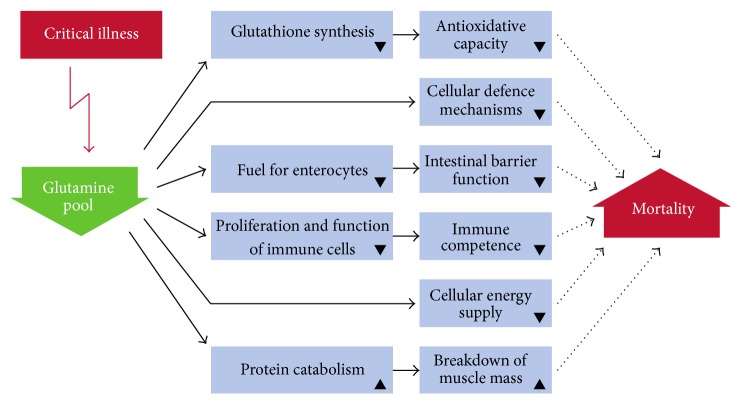L-Glutamine has been suggested to aid muscle recovery and immunity post-workout, but research evidence is mixed.

- Enhance muscle recovery. Limited research suggests that glutamine supplementation can improve muscle soreness and strength after exercise.
- Boost immunity. Glutamine is needed for optimal immune function, but can become depleted during strenuous exercise.
Overview
L-glutamine is the most abundant amino acid that’s naturally produced by the human body. Its structural isomer (a molecule with the same formula but different arrangement of atoms) D-glutamine is not metabolized, which is why L-glutamine is often simply called glutamine.
Roughly 90% of glutamine is produced in skeletal muscles – from glutamate and ammonia – and it is one of the few amino acids that can cross the blood-brain barrier. Its ability to freely enter the brain has given rise to the popular belief that glutamine can function somewhat like a nootropic by boosting neurotransmitter levels.
Just some of the key processes glutamine is involved in are:
- Synthesizing protein
- Providing energy to cells
- Balancing acid-base levels in the kidneys
Its role in muscle protein synthesis and supposed ability to improve muscle function post-workout has popularized glutamine’s use as a recovery supplement for bodybuilding.1

How L-Glutamine Might Help Post Workout Formulas
Sustaining muscle protein synthesis
As one of the 23 proteinogenic amino acids, glutamine is used by the body to build its own proteins, including those found in skeletal muscle.
Supporting immune system function
Heavy prolonged exercise – particularly strenous endurance activity such as long-distance cycling – can deplete glutamine, which is needed for optimal immune function.2 In such cases, glutamine supplementation can recover energy stores and boost immune cell activity.3 4
L-Glutamine Post Workout Benefits & Uses
There are two main reasons most people supplement with glutamine post-workout:
- Boosting immunity. Sufficient glutamine is essential for immune system function and can help prevent illness following strenuous exercise.
- Enhancing muscle recovery. There is a long-standing belief that glutamine enhances muscle recovery after exercise, resulting in benefits such as improved strength and reduced soreness.
In both cases, however, the research evidence is conflicting. It is also important to mention is that the body produces adequate quantities of glutamine by itself, which means that healthy adults really have no need for the supplement. For now, it seems that glutamine supplementation is only truly useful after extended endurance activity that is capable of significantly lowering the body’s glutamine levels, such as marathon running.5

Research
Animal Research
Animal studies suggest that glutamine may:
- Inhibit protein breakdown in rat skeletal muscle.7
Human Research
Clinical studies provide mixed results for the use of glutamine as a post workout.
Glutamine (0.3 g/kg) may speed up muscle strength recovery and reduce soreness
In this randomized, double-blind investigation, 16 adults took either a placebo or 0.3 grams of L-glutamine per kg of bodyweight every day for a 72-hour period after an eccentric exercise involving knee extensions. Postexercise, the glutamine group had greater peak torque than the placebo group. (91 ± 8% vs. 86 ± 7%). Glutamine also lowered soreness ratings 24 hours (2.8 ± 1.2 vs. 3.4 ± 1.2), 48 hours (2.6 ± 1.4 vs. 3.9 ± 1.2), and 72 hours (1.7 ± 1.2 vs. 2.9 ± 1.3) postexercise compared to the placebo group.
- The study concluded that “L-glutamine supplementation resulted in faster recovery of peak torque and diminished muscle soreness following eccentric exercise.”8
Glutamine (0.03 g/kg) does not affect soreness in cyclists
In this investigation, 10 men performed 5 intense bouts of cycling after ingesting either a placebo or 0.03 grams of glutamine per kg of body weight. No significant differences in muscle soreness and time to fatigue were noted.
- The study concluded that “acute ingestion of L-glutamine does not enhance either buffering potential or high intensity exercise performance in trained males.”9
Glutamine seems to reduce the risk of infections in marathon runners
In this investigation, glutamine was offered to runners after exhaustive marathon training and competition. Glutamine was found to reduce the risk of post exercise infections as well as increase the ratio of cells that fight infection (T-helper cells).
- The study concluded that “glutamine after exercise appeared to have a beneficial effect on the level of subsequent infections. In addition, the ratio of T-helper/T-suppressor cells appeared to be increased in samples from those who received glutamine.”10
Glutamine (100 mg/kg) does not improve immune system function after strenuous exercise
In this randomized investigation, 16 runners were given 4 doses of either placebo or 100 mg of glutamine per kg of bodyweight after running a marathon. Glutamine supplementation was found to have no noticeable effect on the activity or response of the immune system on the exercise-induced changes based on examination of the lymphokine activated killer (LAK) immune cells.
- The study concluded that “glutamine supplementation in vivo had no effect on the lymphokine activated killer (LAK) cell activity, the proliferative responses or the exercise-induced changes in concentrations or percentages of any of the leucocyte subpopulations examined.”11
Glutamine (o.9 g/kg) does not improve muscle gains or performance during resistance training
In this randomized, double-blind investigation, 31 adults were given either a placebo or 0.9 grams of glutamine per kg of lean tissue mass every day during 6 weeks of resistance training. Muscle analysis found that both groups increased squat and bench press ability by about 30%. Glutamine did not have any significant effect compared to placebo.
- The study concluded that “glutamine supplementation during resistance training has no significant effect on muscle performance, body composition or muscle protein degradation in young healthy adults.”12
Dosage for Post Workout
- Successful research studies have used 20 – 40 g doses of glutamine
- Glutamine supplements range from 1 – 5 grams taken daily
Supplements in Review Says
- L-glutamine 2 – 4 grams post-workout.
There is too little evidence to recommend glutamine. Current research findings are mixed, with some studies showing no post-workout benefit, and others reporting improved soreness and immunity. On the whole, it seems like glutamine supplementation might only be worth it for extremely strenuous endurance exercise, such as marathon running.
Start with 2 – 4 grams of commercial glutamine. If you do want to give glutamine a try, start with lower doses (2 – 4 g).
In this article you referenced “glutamine” when talking about each study. I was wondering if you knew, for each study referenced, if glutamine peptides or L-glutamine was administered to the test subjects. Glutamine peptides and L-Glutamine are very different. Please be more specific. I find this article similar to the thousands of bs reports about D-aspartic Acid NOT raising testosterone. Sodium D-Aspartate (sodium d-aspartate being the specific form of d-aspartic acid that causes a boost in testosterone while D-Aspartic Acid does nothing to boost testosterone)